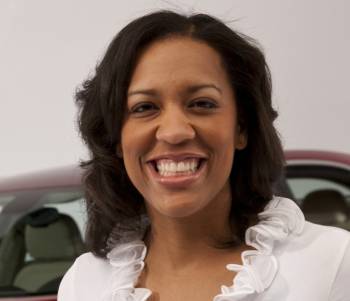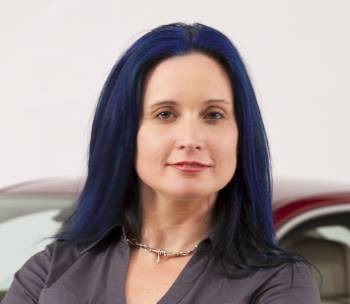
A few weeks ago, I sat down with General Motors' Vehicle Line Manager Tracy Mack-Askew and Aerodynamic Development Lead Engineer Suzy Cody to talk with both women about what it's like to be a woman building cars in Detroit.
Here's what they had to say.
TARA: Tracy, How did you get interested in an engineering career?
TRACY: I have a father who raised me to be independent. When I said "I want to go be a cheerleader," he said, "No, there is no point in cheering for somebody. Go play on the team." I played volleyball, I ran track, I played basketball. He was the type of father that always instilled in me the importance of to being able to take care of myself.
My parents are not very science or tech-oriented. My father is a lawyer and my mother is a social worker, but I just had a tech knack. As a kid, I would put together the other kids' toys. I could fix a lot of things around the house my dad couldn't! My parents nurtured that.
TARA: Do you think your choice to become an engineer was affected by any special efforts to get women into the field?
In high school, I was a part of the Society of Women Engineers mentoring program. As a part of that program, we would meet with the women that were already working in the industry.
When I was in high school, I was still kind of trying to figure out what I wanted to do, and if I wanted to be a lawyer like my dad. I was in the engineering club. I was in the future lawyers club.
But I kept having these interactions with women engineers. We were actually paired with women that worked in the engineering industry. Interacting with people who actually did the job made it seem more real, more attainable, more compelling and interesting. I think that that Society of Women Engineers mentoring program caused me to choose engineering.
In one of the meetings, they took us to a crash site where we got to see crash dummies in the car then get crashed. It was exhilarating -- the pace, the speed, the uniqueness. I said, "this is what I want to do."
TARA: Wow, you just knew. What happened next?
TRACY: I had the opportunity to go to Rensselaer Polytechnic Institute (RPI) for the summer and fell in love with the school. After high school, I matriculated into RPI.
In college, I got an internship with General Motors. I've been with General Motors ever since I was 17. I came on full-time after I graduated from college.
TARA: What about you Suzy, how did you get interested in engineering?
SUZY: I also grew up in Detroit, but I didn't do any of the programs Tracy did. I fell into engineering, I guess. I was drawn to it because it's an objective subject. I could never really get into a subject in school that required your grade to be based on somebody else's opinion.
I gravitated towards objective subjects but I liked things with a creative side too. Engineering seemed to be a way I could use my creativity and get the objective math and science, too.
TARA: You've had a really interesting experience as a working mom. Tell us about that.
SUZY: When I had my first kid I came back to work after six weeks, which is the standard maternity leave. My first day back was terrible. I sat at my desk and cried. I loved my job but with my child it had become clear to me that there was more to life than just working. I went back full-time and my mom watched the kids. It was okay.
When I got pregnant with my second kid I felt, "I'm just missing out too much." I sat down with my then-husband and we worked out financial stuff. I was planning on quitting.
Then I sat down with my boss at GM and talked to him about it. He asked me if I would consider a half-time opportunity. I had a lot of experience to offer a firm in my field and my boss didn't want to let that go.
I said no to his half-time offer because I know how half-time works; It means you get paid for 20 hours but you still work 40. He promised me that I would only have to work 20 and I would get paid for 20.
I worked halftime at General Motors for three years. When my second child was starting preschool, I decided, "I'm ready to come back."
TARA: What have been some of the challenges you experienced as a woman in your field?
SUZY: When I started I was 21, just turned 22. It was easy to be intimidated walking into a boy's club. The biggest challenge is being able to say, "I know what I'm talking about here" without being overly pushy, too.
TARA: Many women know that they need to be authoritative, but walk a line where they're not seen as too pushy. How do you do that?
SUZY: I use humor a lot. I goof around. A big part of it is just relating to people on a personal level. That's not necessarily a gender-specific thing. I think that's just a people-thing in general. For example, with my lead designer we've just been texting back and forth about work and it turned into a trading back and forth of Monty Python quotes.
TARA: That's a great segue into a question I wanted to ask both of you. There is an idea in the women in leadership conversation that a new feminine style of leadership that is more collaborative and empathetic is needed in corporate america -- and is becoming more prevalent. What do you think of that idea?
SUZY: I think it's great. A lot of men feel the need to be consistently stereotypically masculine, and this will help them now show their softer side. I think the world needs a lot more sensitive men. Plus, anybody in the workforce realizes that their work takes such a significant chunk of their time that they want to be happy with it. One of the best things that makes people happy at work is freedom to be themselves.
TRACY: I agree. Traditionally, many women leaders felt that they had to kind of act like men in order to get ahead. As time goes on and there are more and more different types of women leading, women can be more of who they really are -- including if that happens to be more collaborative and more empathetic.
TARA: If you were just made CEO of a major auto company, what would be some of the major decisions, visions, changes you would implement?
SUZY: Oh boy. I would say nobody has to work on Fridays anymore! Just kidding.
The first thing that I would do as CEO is resign my position and recommend that they hire Tracy. One thing that I have learned is my limitations. I'm pretty sure that a job like that would kill me.
But seriously, for an automotive company, I would like to see them get more in touch with the consumer. More field work. We need to be less focused on"what do you want to drive?" and more focused on looking at customers' whole lives and seeing how a car can best fit into your life.
TARA: Tracy, how about you? What would you do as CEO?
TRACY: If I were CEO of a major auto company, I would want to spend some time on strategy. No matter what company you're in, there is a lot of time executing. We need to spend more time being strategic and visionary -- trying to layout the path and plans for the next 50 years, not the next 5 to 10. I'd consider major new directions -- potential mergers, creative joint ventures or alternative approaches to automotive transportation -- like something like what Zipcar does.
One of the things I'd look at is latent customer needs. I think auto companies do a good job today of meeting current needs but the question is, "What can we do to meet customers' latent needs -- things they don't know they want?"


Tracy Mack-Askew & Suzy Cody
Tara Sophia Mohr is an expert on women's wellbeing and leadership. A coach, writer and teacher, she is the creator of the global Playing Big leadership program for women. Visit here to get Tara's free guide, the 10 Rules for Brilliant Women Workbook.